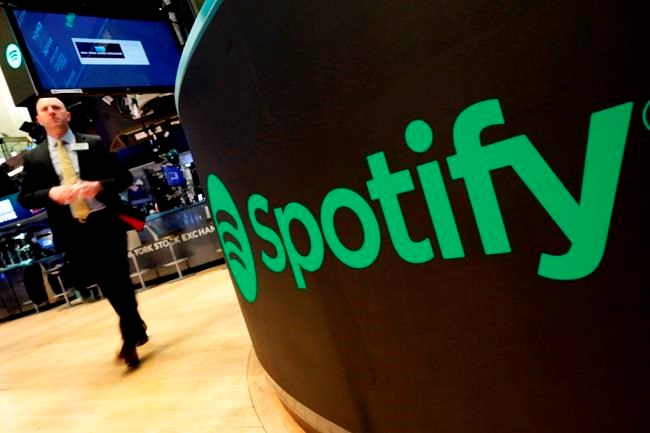Audio streaming platform Spotify says that requiring it to make a contribution aimed at supporting Canadian content could force the company to cut its existing investments in order to maintain its financial viability.
As the CRTC continues its process of determining how to implement the federal Online Streaming Act, which received royal assent in April, representatives from the Sweden-based company told panellists at a hearing Wednesday that Canada is now in a unique position.
The legislation, formerly known as Bill C-11, is meant to update federal law to require digital platforms to contribute to and promote Canadian and Indigenous content.
The CRTC is exploring whether online streaming services should be asked to make an initial contribution to the Canadian content system and whether this would help level the playing field for local companies, which are already required to support Canadian content.
“We can't be the only jurisdiction in the world that is asking you for contributions,” Joanne Levy, commissioner for Manitoba and Saskatchewan, told Spotify representatives in her questioning following their opening remarks.
“I'd like to know a little bit more about what's happening in other jurisdictions.”
But Olivia Regnier, senior director of public policy for Spotify, called it “a bit of an exceptional situation.”
“Actually, you are the only country in the world that is looking at those contributions, at least at this stage,” she replied.
“We actually hope that this is not going to spread to other countries because it will be a real difficulty.”
The company said that since launching in Canada in 2014, Spotify has supported the Canadian music industry through playlisting, marketing campaigns, partnerships and training.
Nathan Wiszniak, head of artist and label partnerships for Spotify Canada, said 80 per cent of Canadian record labels' and artists' revenue last year came from streaming services.
Canada's legacy media broadcasters have expressed support throughout the CRTC hearing, which is in its second week, for the regulator's proposal to mandate an initial base contribution from foreign streaming giants.
They argue such funds are needed, or even overdue, to help offset a financial crisis that has particularly touched their news divisions.
But Wiszniak said imposing that potential requirement on platforms would be "premature" and risks "overlooking the many ways that Spotify already contributes to and supports Canadian and Indigenous artists."
"A regulatory framework that does not adequately consider these factors could jeopardize our nine years of tailored investments and impact Spotify’s ability to continue to support artists and discoverability in ways that makes sense for the modern streaming age," he said.
Regnier said the company directs around 70 per cent of its music revenue back to the music ecosystem through royalties paid to rights holders, who then pay artists and songwriters.
"These streaming royalties are the foundation on which the music industry operates, and in particular the labels' investment in Canadian production and Canadian music," she said.
"Royalty payments from music streaming services are more than simply a cost of doing business. They represent a fundamental component of Canada’s music sector and of investments in the production of Canadian music."
According to Business Insider, artists on the platform make around US$.003 and US$.005 per stream, though Spotify itself does not pay per stream. Instead, it pays per “streamshare,” a figure that is determined by adding up how many times music owned or controlled by a particular rights holder is streamed, divided by the total number of streams in the market it is streamed in each month.
Last month, Spotify announced a new policy regarding royalty payments, eliminating payment for songs with less than 1,000 annual streams starting in 2024.
But Regnier said that because of "high payments," streaming services operate on "extremely low or even negative margins."
She said the remaining 30 per cent of Spotify's music revenues go to covering costs and making investments, including to promote local arts and festivals.
"We basically contribute massively to the music sector in Canada. We contribute in a different way from traditional broadcasters," Regnier said.
"And that's why the idea of an additional base contribution is, let's say, a bit at odds with what we feel we're already doing."
She said an additional financial burden "will oblige us to look at costs elsewhere and see how we can absorb that."
Instead, the company proposed the CRTC consider alternatives, such as using profits or revenues not already being paid back to the music industry as the basis for calculating obligations.
"Or, in this initial stage, it could adopt a low-fee approach that is sustainable for music streaming services," Regnier said.
The three-week hearing will continue Thursday, when it is set to hear from representatives of Netflix.
— With files from The Associated Press
This report by The Canadian Press was first published Nov. 29, 2023.
Sammy Hudes, The Canadian Press

